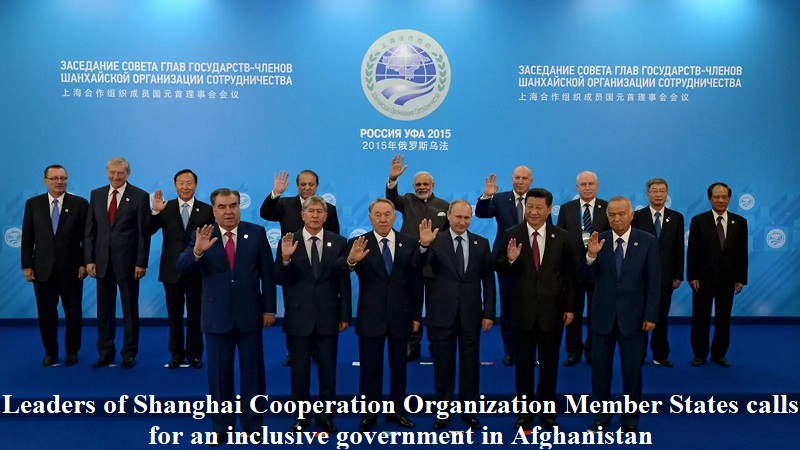
Expressing concern about the situation in Afghanistan, leaders of the Member States of the Shanghai Cooperation Organization (SCO) have called for the establishment of an inclusive government in Afghanistan that includes representatives from all ethnic, religious, and political groups in Afghan society. They have also pledged to continue assisting the Afghan people.
The New Delhi Declaration of the Council of Heads of State of the Shanghai Cooperation Organization was adopted by the member countries on Tuesday. The summit, held under the presidency of India, was chaired by Prime Minister Narendra Modi.
The SCO Member States emphasized the need for an inclusive government in Afghanistan, stressing the importance of involving representatives from all ethnic, religious, and political groups. Prime Minister Narendra Modi, who chaired the summit, stated that India’s concerns and expectations regarding Afghanistan align with those of most SCO countries, emphasizing the importance of coming together for the well-being of the Afghan people.
The joint declaration highlighted shared priorities such as humanitarian assistance to Afghan citizens, the formation of an inclusive government, the fight against terrorism and drug trafficking, and ensuring the rights of women, children, and minorities.
The member states recognized the historical significance of Iran becoming a full member of the SCO and noted the importance of Belarus achieving the status of an SCO member. They appreciated the outcomes of India’s presidency in terms of promoting multi-faceted and mutually beneficial cooperation.
The member states called for greater effectiveness of the World Trade Organization (WTO) as a platform for discussing international trade and adopting regulations. They stressed the need for early implementation of inclusive reform within the WTO and effective functions of monitoring, negotiation, and dispute settlement.
The member states affirmed the significance of improving and reforming the architecture of global economic governance, advocating for an open, transparent, fair, inclusive, and non-discriminatory multilateral trading system based on WTO principles and rules. They opposed protectionist measures and trade restrictions contrary to WTO principles, which undermine the multilateral trading system and threaten the global economy.
Unilateral economic sanctions not approved by the UN Security Council were deemed incompatible with international law principles and detrimental to third countries and international economic relations.
The member states reaffirmed support for China’s Belt and Road Initiative (BRI) and noted ongoing efforts to implement the project, including linking the construction of the Eurasian Economic Union and BRI. They also emphasized the gradual increase in the use of national currencies in mutual settlements.
Recognizing the world’s transformation and rapid technological development, the member states stressed the need for new approaches to international cooperation. They highlighted the growing technological and digital divide, financial market turbulence, reduced investment flows, supply chain instability, protectionist measures, climate change, and the challenges posed by the COVID-19 pandemic.
Based on shared assessments of the regional and international agenda, the member states reiterated their commitment to a multipolar world order based on international law, multilateralism, comprehensive security, and cooperation with the UN playing a central coordinating role.
The SCO is not directed against other states and organizations but is open to broad cooperation based on mutual interests and common approaches to solving regional and global problems. They pursue a policy that excludes bloc, ideological, and confrontational approaches, addressing traditional and non-traditional security challenges.
The member states aim to build a peaceful, safe, prosperous, and environmentally friendly planet, ensuring the harmonious coexistence of humanity and nature. They emphasize cooperation in countering terrorist, separatist, and extremist groups, preventing the spread of religious intolerance, aggressive nationalism, discrimination, fascism, and chauvinism.
Commitment to peaceful settlement of disputes through dialogue and consultations, respect for sovereignty, non-interference in internal affairs, and peaceful development are reaffirmed.

Post Your Comments